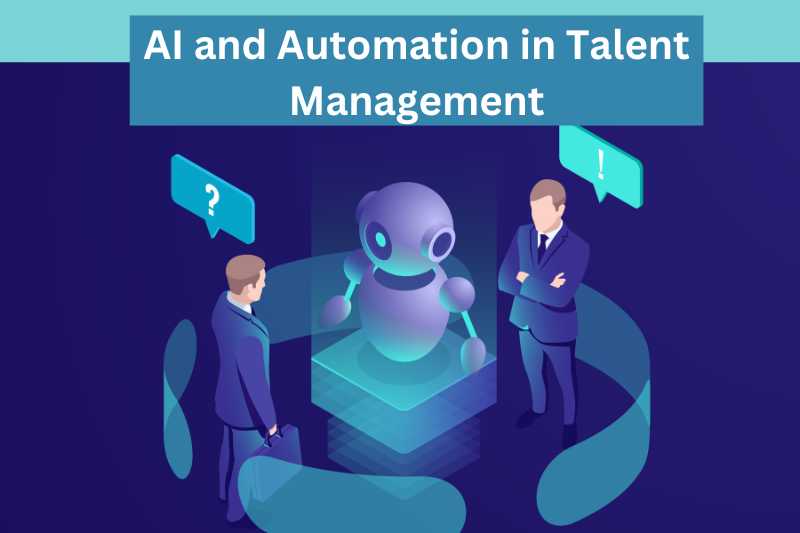Automation and the growing application of AI in HR are driving the rapid evolution of human resources (HR). Businesses may now gain increased productivity, scalability, and better employee experiences thanks to these technologies, which are changing the way HR managers approach talent management with Saas.
AI in HR is especially changing important domains including hiring, performance reviews, and employee involvement. Although there are many advantages to these developments, HR departments also need to carefully consider the new difficulties they provide.
AI in HR
Recent advancements in AI in HR have had a profound impact on the workplace. Many HR processes that once required a lot of manual labor, human judgment, and laborious administrative tasks are now mostly automated or driven by artificial intelligence. Thanks to machine learning and data analytics, artificial intelligence (AI) allows HR departments to evaluate massive amounts of data, spot trends, and make predictions with unprecedented speed and accuracy.
Since automation is freeing HR staff from repetitive tasks, they can now focus on more strategic initiatives. As automation and AI in HR become increasingly integrated, HR departments are becoming more data-driven, proactive, and adaptable, leading to more informed decisions and a more flexible workforce.
AI in Hiring
Recruitment is one of the primary HR domains where AI is significantly influencing operations. Traditional hiring methods usually include reviewing a large number of applicants and conducting numerous interviews, which is a time-consuming and occasionally biased process that can hinder efforts to promote diversity and inclusion.
AI-driven hiring technologies are transforming this market. AI is simplifying the hiring process by automating resume screening, evaluating applicants according to their qualifications, and even conducting preliminary interview rounds with chatbots or video tests. Additionally, AI may examine past hiring data to find trends in qualified candidates, assisting HR managers in making better choices. By emphasizing skills and attributes above demographic traits, this not only lowers hiring expenses but also expedites the employment process and encourages diversity.
AI and Employee Training
Onboarding is essential to a new hire’s smooth integration into the organization after they are chosen. Automation and AI in HR may speed up the onboarding process by empowering new hires to fill out paperwork, become familiar with business policies, and comprehend their jobs on their own. AI-powered digital onboarding platforms provide customized experiences by tailoring the procedure according to an employee’s location, role, and background.
By offering individualized learning routes that adapt to each learner’s skill level and desired learning style, AI also improves employee training. By providing on-demand information, automated learning management systems (LMS) increase training’s efficacy and accessibility. AI solutions can help with ongoing skill improvement, provide more resources, and monitor an employee’s progress.
Additionally, AI-enabled predictive analytics can identify future training requirements, assisting HR departments in proactively filling skill shortages and advancing career advancement. By providing employees with individualized growth opportunities, this improves employee retention and happiness.
AI in Performance Management
Annual or quarterly reviews are usually the foundation of traditional performance management methods, which can be laborious, arbitrary, and ineffective. AI in HR is transforming performance management through ongoing feedback and data-driven insights. AI systems provide real-time performance tracking by analyzing indicators like teamwork, job completion rates, and even sentiment analysis via communication platforms.
AI-driven performance analytics can assist HR professionals in identifying an employee’s strengths and areas for improvement early on, allowing them to deliver timely and useful feedback. The workforce thereby becomes more adaptable and dynamic, encouraging continuous improvement. By use objective data rather than human judgment, AI also aids in eliminating biases in performance reviews, which is essential for promoting diversity and equity in the workplace.
Predictive Analytics and Personalization
Through tailored experiences and predictive insights, AI in HR is also improving employee engagement. AI systems can determine employee engagement levels and forecast attrition risks by examining employee behavior, including attendance, productivity, and communication habits. By addressing each employee’s individual wants and preferences, HR may use these insights to take proactive measures that will increase morale and retention.
AI in HR is also increasing employee engagement by providing personalized experiences and predictive insights. By analyzing employee behavior, like as attendance, productivity, and communication patterns, AI systems are able to predict attrition risks and assess employee engagement levels. HR may use these information to take proactive steps that will boost morale and retention by attending to the unique needs and preferences of each employee.
By looking at emails, polls, and other interactions, artificial intelligence (AI) technologies that apply natural language processing (NLP) can assess employee sentiment. HR departments can spot new trends or problems and act quickly to stop them from harming the company culture by gathering real-time input.
Challenges of AI in Human Resources
Despite the many benefits of AI in HR, there are also disadvantages and ethical considerations to make. One concern is the potential for job displacement as automation may reduce the need for human interaction in some HR processes. However, a lot of experts believe AI will enhance rather than replace HR professionals’ work, allowing them to focus on higher-value, more strategic duties.
Algorithmic prejudice presents another difficulty. Due to their reliance on past data, AI systems have the potential to reinforce prejudices if the training data is faulty. Biased performance reviews or hiring decisions may follow from this. Businesses must make sure their AI systems are transparent, routinely inspected, and built to support diversity, equity, and fairness in order to lessen this.
AI in HR has the potential to completely transform talent management by enhancing the effectiveness, data-drivenness, and personalization of HR procedures. AI is assisting HR departments in making better decisions and developing a more flexible workforce in areas like hiring and employee engagement. Organizations must, however, Ready to streamline your HR processes and drive smarter decisions? Discover how Japfu.ai‘s AI-powered HR solutions can transform your workforce management. Start your free trial today!
